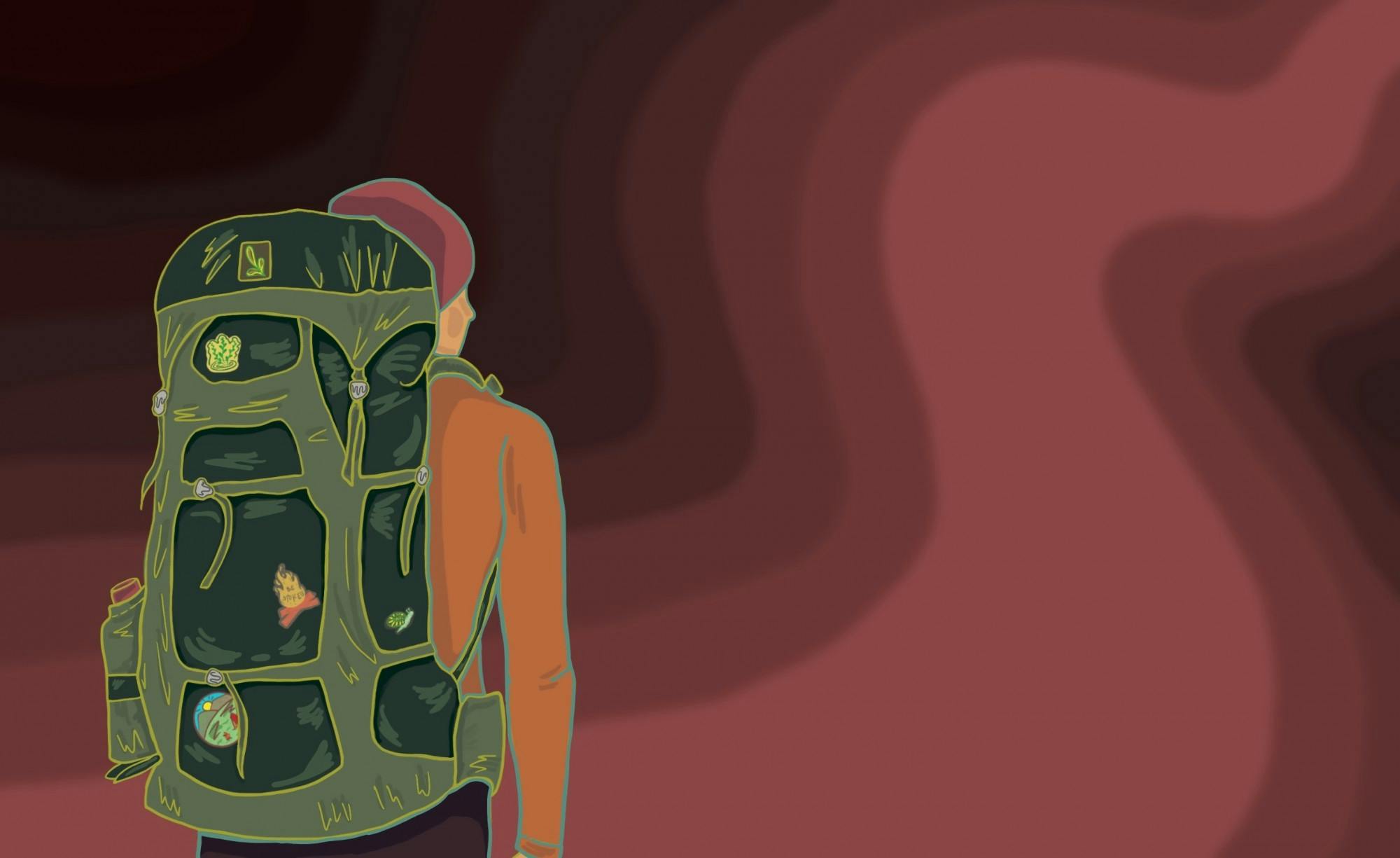With the White Mountains as a backyard, Dartmouth has always provided a temporary home to through hikers, whether they’re just hiking in the area or trekking the entire Appalachian Trail. If your curiosity has ever been piqued by someone in town with a frame pack more than half their size, chances are, you’ve caught a through hiker.
I talked to Finn Haggerty, a Northwestern freshman on a gap year, on his last zero day — a day in which you hike zero miles — before completing the AT. Haggerty — whose trail name,“Huckleberry,” is a play on his first name — started his journey on March 9 in Georgia and expects to finish in Maine in a couple of weeks.
“I wasn’t planning on taking a gap year at all [before COVID-19],” said Huckleberry, who had only ever done day hikes before his five month foray. “I would’ve probably never hiked this trail if it weren’t for COVID.”
The year 2021, for hikers, is a year of polar opposites. Most of us have been chronically inside from one month to the next, so the idea of sleeping under a tarp under the stars feels diametrically opposed to sitting in front of a Zoom screen.
Juliet Rhodes and Ian Meisner, who go by “Disco” and “Gunga Din,” respectively, on the trail, have been hiking with Huckleberry for about 1,500 miles. All three gave their names, but said that they’d prefer to go by their trail names. The three of them met on the AT and currently hike in a pack of six, though Huckleberry said the group reached a dozen at one point.
“We all met out on trail, and just enjoyed each other’s company enough that we stayed together so long, and we’re going to finish together in a couple of weeks,” said Huckleberry. “Sometimes, people join in for a couple of weeks and then go on ahead or fall behind, and that’s just the way it is.”
Gunga Din explained that the apparent spontaneity with which groups form and dissolve is intrinsic to the AT lifestyle. “We only plan ahead in three- or four-day chunks,” he said.
Everything, down to the names that hikers go by amongst themselves, has that same strain of spontaneity. “You’re not allowed to give yourself a name,” explained Disco. “It usually happens organically, so there’s always a funny story behind it.”
Disco’s own trail name comes from the disco ball keychain gifted to her by her aunt that another hiker noticed on trail, and she laughed as she explained how Meisner came to be called “Gunga Din.”
“There’s a Rudyard Kipling poem with the line: ‘You’re a better man than I, Gunga Din,’” explained Disco. “And it’s about one guy getting water for another. So one day, [Meisner] went to the stream and filled a water bottle for this other guy and quoted the poem while he handed it over.”
Disco is a would-be junior at the College of William & Mary who decided to take a term off during the pandemic — and then another, which led to her plan to hike the AT.
“I first heard about [the Appalachian Trail] my sophomore year of high school and just couldn’t get it out of my head. I kept thinking what a weird timeline it was, to be able to take five months off and go hiking,” said Disco. “I took off just the fall term from school, but the reviews [of school] from my friends were pretty negative, so I thought ‘Why rush it?’”
A few weeks out from the finish line, Disco feels she made the right call. “I love the people, I love the adventure — just taking control of my life is kind of great. I feel strong and like a badass. Those are the things that come from living in the woods for four months,” she said.
Gunga Din said that his decision to hike the AT was somewhat simpler. “It scared me, so I wanted to do it,” he said decisively. A recent college graduate, he explained that COVID-19 had no effect on his hiking plans, as he would’ve done the AT with or without a pandemic to lead him to the great outdoors.
Huckleberry said his impression is that there are more through hikers this year for two reasons: first, people planning to hike the AT last year pushed to this year and second, COVID-19 offered the opportunity to more people that normally wouldn’t have had the chance.
The hikers have been staying in hostels along the way, often exchanging an hour of work for a bed. When passing through Hanover, “The Little Hotties,” as Gunga Din referred to his group of six hikers, stayed with a “trail angel,” someone who offers assistance in the form of food, shelter or words of wisdom to hikers.
Gunga Din noted that they tried to “go to the place with $3 margaritas” while in Hanover, which Dartmouth students will lovingly recognize as Molly’s, but ended up at Dunk’s instead. While in town, Disco met up with a high school friend and current Dartmouth student at Umpleby’s.
Being a through hiker, all three noted, means you often find yourself talking to strangers about their own connection to hiking — someone’s husband, sister or friend once hiked the Whites too.
“It’s always positive,” said Disco, of people who come up to her to ask about hiking. “Never judgmental.”
Disco also recalled that they had an unconventional trail angel in the form of a Dartmouth student.
“One of the guys I’ve been hiking with swindled his way into the dining hall, and he got himself a lot of food with a Dartmouth kid’s meal swipe,” she said.
Snacks achieve a level of sanctity when you’re doing 20 miles a day, according to Huckleberry.
“We’re just always hungry because we’re hiking 8 hours a day,” he said. “‘Hiker hunger’ is what people call it.”
There’s a real rhythm to life with spotty cell service, and for Gunga Din, that’s part of the draw.
“I love the lifestyle,” he said. “When we’re not hiking, we’re eating. When we’re not eating, we’re sleeping.”
Most of the Little Hotties are also planning to hike the Pacific Crest Trail, which stretches from southern California to the Canadian border, in the future — but right now, they’re just enjoying the journey.
“We’re all getting tired, and none of us have a deadline to be done, so we’re taking our time,” Huckleberry said. “We don’t want to rush the end of this.”
Disco, reflecting on her experience, thought about the memories that would stick with her when the last 200-something miles of the trail were behind her.
“The most stand-out moments are the most simple ones,” she said. “It’s not so much the big, grand, ‘I just climbed thousands of feet to get to this peak.’ It’s really just that sense of relief when you finally show up at camp and all of your friends are there. If you get one thing from this conversation, it’s that the friendships are the biggest deal.”





